| Srl | Item |
| 1 |
ID:
109759
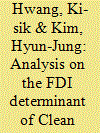

|
|
|
| 2 |
ID:
102449


|
|
|
|
|
| Publication |
2010.
|
| Summary/Abstract |
This paper examines a lacuna in the literature on foreign direct investment (FDI) flows to China: the absence of analysis for the prominent location of small Caribbean and Pacific islands as leading sources of FDI. An indeterminate amount of domestic capital is embedded in these FDI flows, which distorts comparative studies on FDI in developing economies between China and other states. Direct investment from China has also increased in recent years and offshore financial centres (OFCs) often serve as the initial destinations. This paper excavates the rationales behind the presence of OFCs and suggests that Chinese actors will emulate the practices of developed state multinational corporations and high-net-worth individuals. The implications of these investment practices are outlined along with possible trajectories for their impact on the process of financial liberalisation in China. Consequently, it encourages increased Chinese participation in the development of global financial governance.
|
|
|
|
|
|
|
|
|
|
|
|
|
|
|
|
| 3 |
ID:
189064
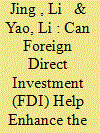

|
|
|
|
|
| Summary/Abstract |
More frequent adjustments in macroeconomic policies around the world after the 2008 global financial crisis and the increasing instability of global supply chains due to the ongoing COVID-19 pandemic have presented companies which have foreign direct investment (FDI) with great difficulty in stabilising capital structure. This article attempts to investigate the impacts of FDI on the capital structure stability of Chinese companies based on the firm-level panel data from 2005 to 2019. The empirical results show that FDI has significant negative indirect impacts on both the market value and book value of capital structure volatility of host companies by changing companies' financial constraint status. These impacts vary for firms of different ownership types and weakened after the 2008 global financial crisis.
|
|
|
|
|
|
|
|
|
|
|
|
|
|
|
|
| 4 |
ID:
174818
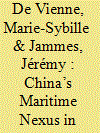

|
|
|
|
|
| Summary/Abstract |
At the 17th ASEAN Regional Forum in 2010, Chinese Minister of Foreign Affairs Yang Jiechi reminded everyone that “China is a big country and all the other countries are small countries; this is a fact.” Though Brunei is the smallest of all the ASEAN states in both population and GDP, the level of Chinese investment in the sultanate (cumulated direct investment and construction contracts divided by 2018 GDP) is much higher than in most other ASEAN states. This paper analyzes the Belt and Road stakes for both Brunei and China and Brunei’s response to the Chinese proposals, showing that in spite of its smallness, the sultanate still seems able to preserve its own interests to a certain extent, thanks to its balanced foreign policy and its financial resources.
|
|
|
|
|
|
|
|
|
|
|
|
|
|
|
|
| 5 |
ID:
191951


|
|
|
|
|
| Summary/Abstract |
The cross-strait relations between Taiwan and China are critical in the Asia Pacific and the world. This study focuses on economic relations and their implications. The main conclusions include: First, the economic gap in output is increasingly larger, thus favouring China. Based on a time series robust least squares model, this study finds that this economic strength will significantly reduce the number of Taiwan’s foreign allies. At the same time, this economic strength also brings military imbalance. Second, by employing the Granger causality tests to examine the causality relations between the stock markets of Taiwan and China, which reflect the economic integrations in areas such as the trade of goods and services and capital flow, this study finds that China is in a dominant position. At the same time, Taiwan is in a dominated position. However, except for tourism, the effects of China’s dominant position as leverage seem limited.
|
|
|
|
|
|
|
|
|
|
|
|
|
|
|
|
| 6 |
ID:
165345


|
|
|
|
|
| Summary/Abstract |
Foreign direct investment (FDI) can deliver benefits beyond the provision of capital, such as efficiency gains. We argue that the theorised positive effects of economic linkage are reduced when linkages are based on natural resources. Domestic elite coalitions supporting reform are also weaker in countries with extensive natural resources. Kazakhstan and Azerbaijan have high-value natural resources and significant FDI, making them most likely cases for reform. Kyrgyzstan is a contrasting case as it has few natural resources. We find that the institutional reforms we would anticipate because of linkages have not occurred and those that exist are often cosmetic.
|
|
|
|
|
|
|
|
|
|
|
|
|
|
|
|
| 7 |
ID:
137401
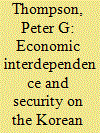

|
|
|
|
|
| Summary/Abstract |
Given North Korea’s desire to maintain nuclear weapons—and barring its unexpected collapse—how can the US and its allies establish and maintain a peaceful Northeast Asia? Current US policy alternatives do not offer an effective means for removing North Korean nuclear weapons without creating many more serious problems that jeopardize a stable future for Northeast Asia. However, by engaging in foreign direct investment (FDI) through North Korea’s special economic zones, the United States and other nations can engage North Koreans at all levels of society and build a future environment of cooperation and stability. Such a long-term engagement policy will prove more successful than isolation, sanctions, or military force, and will bolster regional actors’ efforts to develop additional stability-inducing policies.
|
|
|
|
|
|
|
|
|
|
|
|
|
|
|
|
| 8 |
ID:
174775
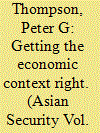

|
|
|
|
|
| Summary/Abstract |
World War I has become the “go-to” analogy for understanding the contemporary security dynamic in East Asia, especially as it concerns US-China relations and the possibility of war. However, this analogy fails to account for the fundamental changes in economic flows in the current environment, specifically the growth and proliferation of foreign direct investment (FDI). Capital flows were primarily portfolio investments in 1914, while FDI flowed from great powers to secondary, allied states. This is not representative of East Asia today, where FDI flows between possible belligerents in any future conflict and global value chains link states within and across regions. Ultimately, World War I may no longer provide a satisfactory analogy for understanding the impact economic interdependence has on modern war given FDI’s importance in the global economic system.
|
|
|
|
|
|
|
|
|
|
|
|
|
|
|
|
| 9 |
ID:
102297
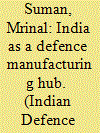

|
|
|
| 10 |
ID:
100367
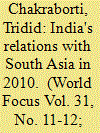

|
|
|
| 11 |
ID:
164203
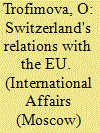

|
|
|
|
|
| Summary/Abstract |
SWITZERLAND holds a special place in Europe. It has one of the world's most stable and competitive economies, which uses the cluster model of organization and is based on sectors that have traditionally given competitive advantages to Switzerland such as high-tech industries, including the manufacturing of watches and precision machinery, the pharmaceutical industry, the manufacturing of some food products, and the service sector. Switzerland owes these advantages to customization for specific clienteles, to a relatively large share of capital-intensive and high-tech products in its total output, to high-standard after-sales service, to its convenient geographical location, and to the effective use of resources, and to the Swiss national character with its self-discipline and sense of responsibility. Switzerland's best-performing sectors are industries that need skilled labor and relatively low inputs of raw materials, and are chiefly export-oriented.
|
|
|
|
|
|
|
|
|
|
|
|
|
|
|
|
| 12 |
ID:
156466
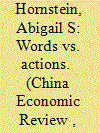

|
|
|
|
|
| Summary/Abstract |
We examine whether companies from certain countries are more likely to fulfil investment pledges. Using data on contracted and utilized FDI in China, we find that firms fulfil an average of 59% of their pledges within two years. The propensity to fulfil pledges is lower for firms from countries with greater uncertainty avoidance, power distance, and egalitarianism; higher if the source country is more traditional; and is unaffected by popular attitudes towards China. Prior literature has found that these cultural characteristics are associated with higher levels of utilized FDI. We extend this to show that announcements of planned corporate activity may be more reliable for firms from countries with certain cultures.
|
|
|
|
|
|
|
|
|
|
|
|
|
|
|
|